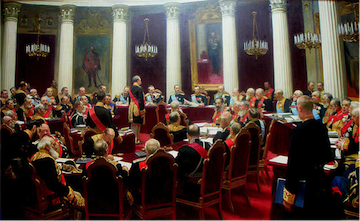

|
Conservative Opposition to Stolypin  State Council The first sign of the court's opposition to Stolypin was over the Naval General Staff Bill in 1909. Proposed by the Octobrists in the Duma's Committee of Imperial defence, which had a veto over the military budget, the bill threatened to refuse the navy credits unless the Naval General Staff came under the control of the Ministry of War rather than the court. Nicholas saw the ultimatum as an attempt by the Duma to wrest military command from the crown, and used his veto the block the bill. He was infuriated that Stolypin and his Council of Ministers had supported the bill, but stopped short of accepting his offer to resign. The naval staff crisis brought together Stolypin's reactionary enemies in defence of the Tsar's autocratic prerogatives. They managed to defeat virtually all Stolypin's political innovations. His proposal to expand the state system of primary schools was defeated by reactionaries in the Church, who had their own interest in education. The same fate awaited his legislation to ease discrimination against the Jews and other religious minorities. Stolypin's local government reforms were bitterly opposed by the United Nobility because they challenged the gentry's domination of rural politics. Their aim was to give the peasants, as landowners, representation in the zemstvos equal to that of the nobles. They also proposed to abolish the peasant-class courts and bring the peasants fully into the system of civil law. Stolypin saw these reforms as essential for the success of his land reforms. The new class of conservative peasant landowners which he hoped to create would not support the existing order unless they were made citizens with equal political and legal rights to those enjoyed by other classes. Stolypin proposed to establish a new tier of zemstvo representation at the volost' (rural district) level, in which the franchise would be based on property rather than birth. The gentry was afraid that the zemstvos would be swamped by the peasants. They rallied their forces against him in the Duma, the State Council and the United Nobility, forcing him to give up his reforms. |
© 2014 Orlando Figes | All Rights Reserved